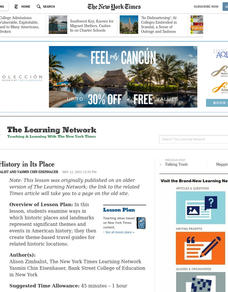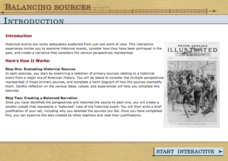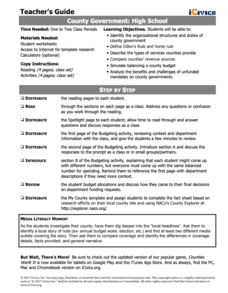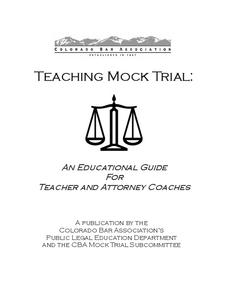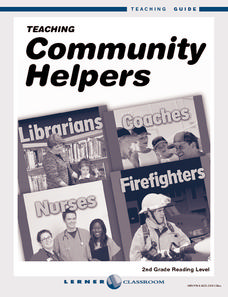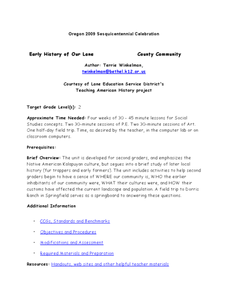Curated OER
Creating Historians: Send Them Out
Get teenagers out of the classroom in the pursuit of history; part three of a series on approaching social studies as a group of historians.
Curated OER
Exploring Community Through Local History: Oral Stories, Landmarks and Traditions
Learners explore the history of their local community. In this local history lesson, students analyze primary documents to develop an understanding of the local culture and traditions of their local community.
US House of Representatives
House History Comes Alive
How reliable is oral history? The resource uses the oral history website to help academics understand the pros and cons of using recollections to teach others. Scholars complete a worksheet, draft a letter to a representative, and...
Roy Rosenzweig Center for History and New Media
Early English Settlements History Detectives
Young historians play the role of history detectives as they investigate some primary source texts and images related to the early colonization of America, The Jamestown Settlement, and the Mayflower Compact.
Curated OER
Putting History in its Place
Examine ways in which historic places and landmarks represent significant themes and events in American history. Then create theme-based travel guides for related historic locations. This lesson requires informational reference materials...
Curated OER
Local History
Learners research the history of their own town. They post the findings in an iEARN on line forum. They practice research skills and gain an understanding of local history.
Annenberg Foundation
Balancing Sources
Pupils turn into investigative reporters throughout history to learn what it takes to balance different primary sources on the same topic. They use what they learn to create a narrative based on their own interpretation of a historic...
iCivics
County Government: High School
Balancing a budget—the bane of many people's existence! Yet, its' something that must be done, especially in government systems. The resource, fourth in a seven-part series exploring local government, focuses on various exercises that...
Smithsonian Institution
Cuban Missile Crisis
The United States—specifically John F. Kennedy—played a large role during the Cuban Missile Crisis. A history resource poses questions that encourage critical thinking as well as in-depth analysis of images from the time period.
Gobal Oneness Project
Passionate Pursuits
Not all technology is digital. Teach learners about the low-tech maker movement with a photo essay about six artisans from California and two articles about the local creator movement. After tackling the photo essay in small...
Smithsonian Institution
Who's in Camp?
Pupils complete readings, a group activity using cards, and a writing activity to better understand people's lives during the American Revolution. The resource emphasizes people such as the militiamen, women, officers, and children,...
Curated OER
Historic Cemeteries: "History Written in Stone"
Students explore the history of their community through researching grave markers. They visit a local cemetary, partcipate in a cemetary scavenger hunt, conduct a survey for various graves, and write an essay describing their cemetary...
Colorado Bar Association
Teaching Mock Trial
Interested in Mock Trial? Here's a guide designed for teachers and for team coaches that contains everything you need to prepare for the high school mock trial program.
Curated OER
Preserving the Past with Oral History
Students research history by interviewing people in their community. They create a list of questions and record their responses. They end the project with some type of final product which might include a memory book.
New York City Department of Education
Colonial America and The American Revolution
How did the founding of the American colonies lead to a revolution? Use the essential question and sample activities to guide learners through a series of history lessons. Additionally, the packet includes effective strategies to...
PBS
Before We Travel, We Research
Context is key when it comes to historical research. Prior to field research, class members learn as much as they can about the site they are going to visit. Groups investigate and prepare presentations about the history of the site, the...
Lerner Publishing
Teaching Community Helpers
Youngsters discover who the leaders in their community are and what it means to build a community in this four-lesson unit.
Pacific University Oregon
Civil Rights: US History
To gain an understanding of the Civil Rights Movement of the 1960s, class members investigate the Jim Crow Laws, the Emancipation Proclamation, the 13th, 14th, and 15th Amendments of the US Constitution, and the 1898 Supreme Court case,...
Curated OER
Local Pride in a Guide
Students examine the distinctive cultural and historical attributes of Boston and Philadelphia. They research the history, geography and culture of their town or city to create a booklet.
Seattle Civil Rights and Labor History Project
Dr. Martin Luther King's Visit to Seattle
How was the work of Dr. Martin Luther King Jr. viewed by others during the 1960s? After watching an oral history video, your class members will learn more about Dr. King's ability to personally connect with others, as well as...
Intel
Starquest
Almost every ancient culture observed the stars and saw pictures in the patterns. Studying stars allowed them to guide travelers, determine when to plant crops, when to harvest food, and the stories surrounding the images include some of...
Curated OER
Preserving the Past with Oral History
Learners engage in oral history learning by conducting interviews and recording them to documents for the local community.
Curated OER
Early History of Our Lane
Second graders study Native American Kalapuya culture. In this American History lesson, 2nd graders discover the early inhabitants of their community. They take a field trip to Dorris Ranch.
Curated OER
Looking Back - An Art/English/History Interdisciplinary Unit
Learners research historical events of the past century to recognize that society impacts the themes within art and literature. They then interview an individual to develop a biographical narrative, a collage and finally an oral...






